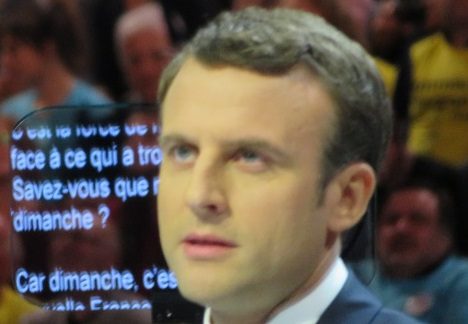Emmanuel Macron, Blairite for the Current Season

He’s been called a political UFO, or the candidate of “marketing”; he’s never held elected office, but 39-year-old Emmanuel Macron is more likely than not to be the next president of France. Last week there were rumblings of worry among Macron’s supporters, as if his Blairite neoliberalism would be seen, ultimately, as hollow by French voters. But he filled Bercy, a venue the size of U.S. pro hockey arena, Monday afternoon in Paris with a slick, well-produced rally, and he leads this morning’s polls. “We’re going to win” (“on va gagner“) and “Macron President” were the most popular chants for the Macronists, slogans devoid of much ideological content.
Macron is a bright young man of the technocratic center. If Mark Zuckerberg proves to have any talent as a speaker, it’s what his presidential campaign will look like. Macron is smart; he’s comfortable with intellectuals; he believes in the market, in modernity, in France’s future, in Europe’s future, in everyone’s future. He was a successful investment banker, became a top economic minister in François Hollande’s very unpopular Socialist government, pushed through some pro-business measures to no great effect, left to form En Marche, his own centrist party. Anti-Macron posters have shown up around Paris recently, showing Macron looking into the mirror and seeing Hollande, one with a photo of the two in embrace. Hollande has intimated he would probably vote for Hollande, rather than the more left-wing candidate (Benoît Hamon) of his own party.

I signed up on the internet for a ticket for the rally, then got into the wrong line out of the subway, the line reserved for core supporters, who would be on the floor of the hall, right in front of the podium. I got through the frisking part of security fine with my American passport and ticket, but subsequently realized I didn’t have the orange plastic bracelet everyone else around me had. But there was no way to leave or go around to the main entrance, against the flow of the crowd though the gates. I spoke to one of the middle-aged Macron rally aides, identified myself as a journalist (but with no French credentials) and prepared to leave and go have a sandwich and a beer once the entering crush died down. But shortly thereafter a Macron aide approached me and snapped one of the special orange bracelets on my wrist. I could attend, and be part of the inner circle yet!
The rally was loud and slick. The crowd was warmed up with speakers and videos, a French-Algerian former rugby star who had become a successful businessman was the first and particularly effective. The crowd was a melange of Paris bobo (David Brooks’s phrase “bourgeois bohemians” has caught on in France in ways it never did in the United States) and the traditional socialist electorate of teachers and civil servants. A fair number of blacks, maybe 5–10 percent, reflective of the French population, many in mixed couples of both sorts. I saw no one who was self-evidently Muslim. In one of the campaign videos, there’s a three- or four-second cut of Macron sharing what appears to be a very good private joke with a woman in a headscarf, but I didn’t see anyone like that in the actual crowd.
Macron is a good enough speaker. His party’s themes are hope and confidence for the future. No to Sens Commun (the traditionalist mass movement that arose in opposition to gay-marriage legislation) yes to abortion, yes to belonging to Europe, yes to what the French call le mariage pour tous.
When Macron came on, there wasn’t that much new to say. He had, I thought, one telling line: France needs “not Thatcher, not Trotsky, not Maurras”—an amusing and effective way of caricaturizing his three main opponents, Fillon, Mélenchon, and Le Pen. Above all France should be be confident in its future, Europe should be confident. The future of France will be as bright as its past. We are the heirs of a France conquerante et confidente.
He paid an homage to the ’68 generation (of Dylan and Walesa and Havel) including with them Rocard and Mitterrand, socialists who are a good deal older. He praised those who had vanquished totalitarianism. He praised innovative France, and the France that renews itself. He spent a long time quoting a letter Diderot wrote to his mistress, in the fading candlelight. “Know, above all, that I love you” was the punchline, and the crowd burst into applause.
Macron is an appealing candidate in many ways and would be more so under different circumstances. It would be hard to feel angry with the people who flocked to Bercy Monday afternoon, all of whom seemed like nice people. The question of course is whether France is in sufficient state of crisis that some modernized and appropriate dose of Thatcher and Maurras—well not really Maurras, more de Gaulle—and probably not too much of Trotsky is what the country seeks, and needs.
I rushed to the Le Pen rally as Macron was wrapping up, and will write about that later. But as a hint: she was effective, she really stands for something; I’m already waffling on my previous prediction she won’t make the second round. I’m including some photos of the Macron event.
Update: Since I left the Macron rally right before the end, I didn’t see that he apparently brought on stage next to him a young woman in a headscarf for the final, exultant, group singing of the Marseilleise.
Comments